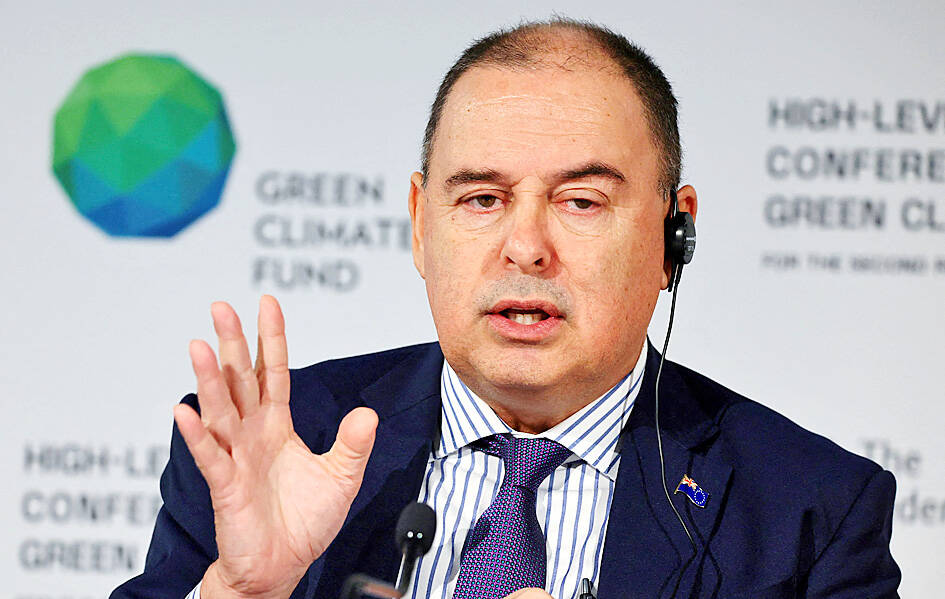New Zealand yesterday expressed renewed concern about the prime minister of the Cook Islands traveling to China this week to sign agreements without properly consulting with Wellington despite the two nations’ constitutional ties.
New Zealand has become increasingly cautious about China’s growing presence in the region and the potential threats it poses to the New Zealand’s national security.
New Zealand Prime Minister Christopher Luxon at a news conference yesterday said that New Zealand expected transparency and consultation after Cook Islands Prime Minister Mark Brown announced that he was heading to China seeking a partnership in national development, including infrastructure, trade and the economy.

Photo: Reuters
The Cook Islands is a nation in free association with New Zealand, which provides budget support and commits to defend the South Pacific nation, whose people are New Zealand citizens.
“Under our constitutional arrangements, we expect, you know, matters of defense and security to be transparently discussed between partners. That’s all we’re asking for here,” Luxon said.
He said once New Zealand knew what was in the proposed partnership, the government would respond.
China did not confirm the visit, but the Chinese Ministry of Foreign Affairs yesterday called the Cook Islands an important partner in the South Pacific.
“China believes that New Zealand and the Cook Islands are both important partners of China,” ministry spokesman Guo Jiakun (郭嘉昆) said.
New Zealand has repeatedly asked the Cook Islands to consult on the contents of agreements that Brown plans to sign with China, but has not received a proper response, New Zealand Deputy Prime Minister Winston Peter’s office said in a statement on Sunday.
Cook Islanders have also questioned secrecy around the agreement.
Tina Browne, leader of the opposition Democratic Party, told New Zealand-based radio station 531pn that people are concerned about the lack of consultation about a proposed Cook Islands passport and then about the agreement with China.
“If there is nothing to hide, why are we not consulting with New Zealand?” Browne asked.

INVESTIGATION: The case is the latest instance of a DPP figure being implicated in an espionage network accused of allegedly leaking information to Chinese intelligence Democratic Progressive Party (DPP) member Ho Jen-chieh (何仁傑) was detained and held incommunicado yesterday on suspicion of spying for China during his tenure as assistant to then-minister of foreign affairs Joseph Wu (吳釗燮). The Taipei District Prosecutors’ Office said Ho was implicated during its investigation into alleged spying activities by former Presidential Office consultant Wu Shang-yu (吳尚雨). Prosecutors said there is reason to believe Ho breached the National Security Act (國家安全法) by leaking classified Ministry of Foreign Affairs information to Chinese intelligence. Following interrogation, prosecutors petitioned the Taipei District Court to detain Ho, citing concerns over potential collusion or tampering of evidence. The

‘FORM OF PROTEST’: The German Institute Taipei said it was ‘shocked’ to see Nazi symbolism used in connection with political aims as it condemned the incident Sung Chien-liang (宋建樑), who led efforts to recall Democratic Progressive Party (DPP) Legislator Lee Kun-cheng (李坤城), was released on bail of NT$80,000 yesterday amid an outcry over a Nazi armband he wore to questioning the night before. Sung arrived at the New Taipei City District Prosecutors’ Office for questioning in a recall petition forgery case on Tuesday night wearing a red armband bearing a swastika, carrying a copy of Adolf Hitler’s Mein Kampf and giving a Nazi salute. Sung left the building at 1:15am without the armband and apparently covering the book with a coat. This is a serious international scandal and Chinese

Seventy percent of middle and elementary schools now conduct English classes entirely in English, the Ministry of Education said, as it encourages schools nationwide to adopt this practice Minister of Education (MOE) Cheng Ying-yao (鄭英耀) is scheduled to present a report on the government’s bilingual education policy to the Legislative Yuan’s Education and Culture Committee today. The report would outline strategies aimed at expanding access to education, reducing regional disparities and improving talent cultivation. Implementation of bilingual education policies has varied across local governments, occasionally drawing public criticism. For example, some schools have required teachers of non-English subjects to pass English proficiency

TRADE: The premier pledged safeguards on ‘Made in Taiwan’ labeling, anti-dumping measures and stricter export controls to strengthen its position in trade talks Products labeled “made in Taiwan” must be genuinely made in Taiwan, Premier Cho Jung-tai (卓榮泰) said yesterday, vowing to enforce strict safeguards against “origin laundering” and initiate anti-dumping investigations to prevent China dumping its products in Taiwan. Cho made the remarks in a discussion session with representatives from industries in Kaohsiung. In response to the US government’s recent announcement of “reciprocal” tariffs on its trading partners, President William Lai (賴清德) and Cho last week began a series of consultations with industry leaders nationwide to gather feedback and address concerns. Taiwanese and US officials held a videoconference on Friday evening to discuss the